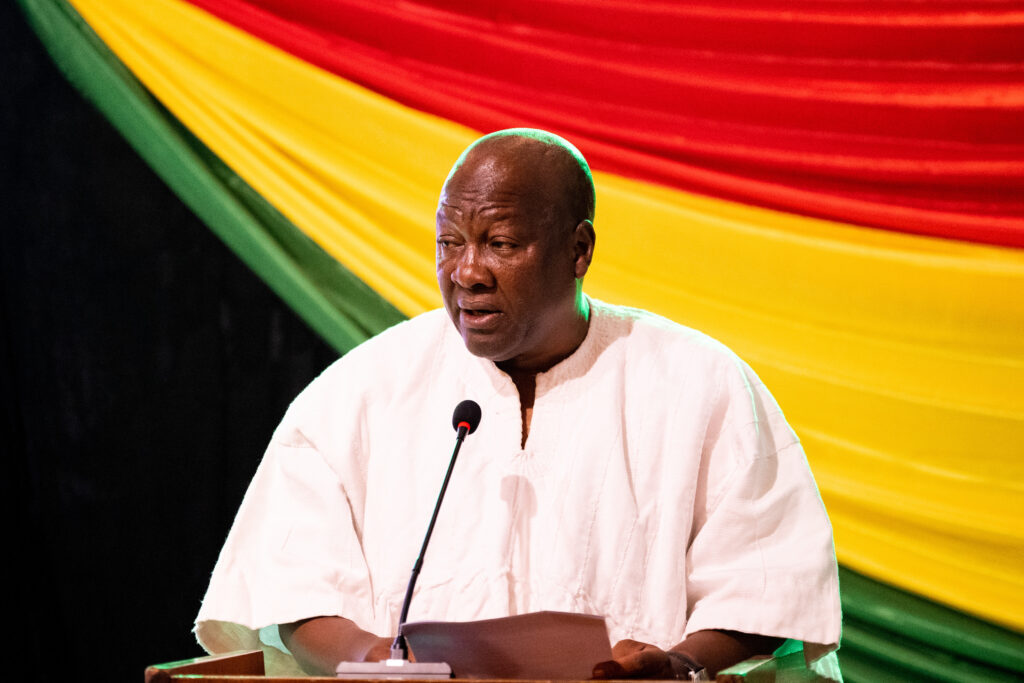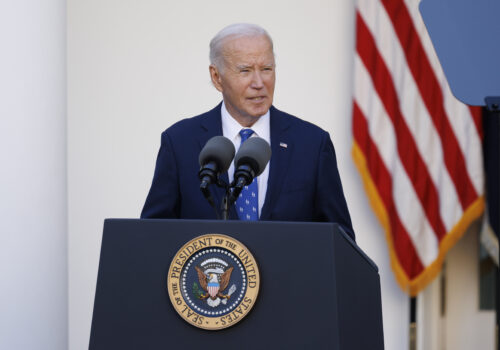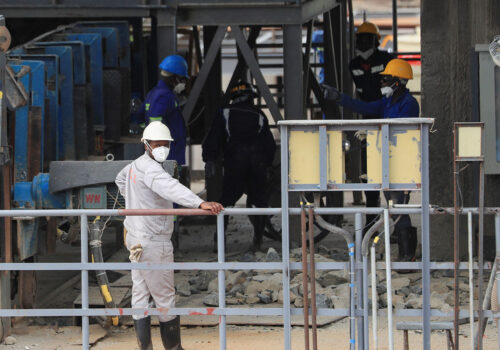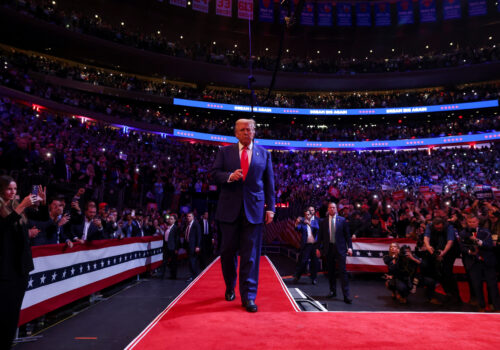On December 7, John Dramani Mahama emerged as the winner in Ghana’s presidential election. His victory follows an energetic campaign that seemed to revolve around one central theme: the ensuing economic hardship that has been imposed on the Ghanaian population amid the country’s dire financial straits.
It may be tempting to blame Ghana’s situation on the outgoing president, Nana Akufo-Addo, who will leave office in January. And, granted, the Akufo-Addo administration has its fair share of responsibility for Ghana’s financial predicament. But the roots of the problem run deeper. For years and across several administrations, Ghana’s government has relied too heavily on excessive borrowing from domestic and international capital markets to finance fiscal expenditures. Mahama himself previously lead Ghana between 2012 and 2017. He was voted out at the end of that one term, which should serve as a reminder that the population is eager for change and ready to remove any leader who moves too slowly. Mahama, who is known as a pragmatist, will need to turn the situation around swiftly considering the popular discontent.
To get out of the current financial predicament and reset its economy, Mahama and his administration will need to reform how it governs its gold, oil, and cocoa industries. But to enact these necessary economic reforms, Ghana and the international community will need to follow through on the country’s external debt restructuring.*
Ghana’s debt crisis
How did Ghana get to this point? The country’s ramp-up in external borrowing was made possible beginning in 2004, after it had completed the Heavily Indebted Poor Countries program—a debt-relief program created by the International Monetary Fund (IMF) and the World Bank for developing countries. Then, energy companies discovered the Jubilee Oil Field in 2007, followed by several other oil fields. This coincided with the start of the era of low interest rates following the global financial crisis. The easy financing conditions and the anticipated revenues from this new oil find stimulated large infrastructure projects. Then, the outbreak of the COVID-19 pandemic resulted in a pervasive decline in investment and production in the oil sector in Ghana. In turn, revenues fell, even as large-scale borrowing from international markets continued as a “gamble for redemption.”
This all came to a halt in 2022, when the depreciation of the cedi, Ghana’s currency, raised external debt and interest payments so high that they surpassed government revenues, which led Ghana to default on its eurobond obligations. Total public debt, which includes both external and domestic debt, reached 92 percent of gross domestic product (GDP) at the end of 2022, which is far higher than the average among Sub-Saharan African countries. Public debt has since declined but remains high (around 83 percent of GDP).
Other factors have also contributed to the country’s economic problems. Just a few months ago, Ghana lost an arbitration case against Trafigura, a commodities multinational, over the rupture of an energy contract, which will cost the country more than $140 million. This outcome has enraged civil society.
In an attempt to stop the crisis, the government has restructured its domestic debt and, in October, announced a deal to restructure its external debt that could be completed by June 2025. This is good news after protracted negotiations, but the final elements of the deal and the issues of implementation and enforcement remain important hurdles to clear. Delay on dealing with these issues could subdue growth and increase poverty. Indeed, poverty in Ghana has worsened over the past few years, reaching more than 30 percent of the population.
The current situation is reminiscent of the troubled economic times of the 1990s, when Ghana, like many developing countries in Africa, faced a debt crisis. It took more than ten years for debt relief initiatives to deliver an economic reset. But what is different this time is that private creditors, as well as China, have become important players, making it more difficult for creditors to coordinate to deliver an expedient debt resolution. The debt treatment under the G20 Common Framework has been too slow, and the rules lack clarity and enforceability. The lesson from Ghana is that countries facing debt crises cannot afford to wait for this process to be fixed. The international community needs to support indebted developing countries in a much more decisive and urgent way, perhaps by bringing more forceful actions against creditors, especially private creditors, by enforcing the comparability of treatment.
What Ghana needs now
A more expedient debt resolution for Ghana is a necessary condition for an economic reset. One key objective for Ghana is to rebalance its structure of external capital away from external debt and toward foreign direct investment. This would shift the international investment position away from debt and toward equity. That accrued foreign direct investment would bring much more stability to its external financing, a needed boost to productivity, economic growth, and job creation that Ghanaians have been longing for. But Ghana must also achieve a radical governance shift in key sectors to deliver that economic growth.
Ghana’s export structure is dominated by three commodities—gold, oil, and cocoa—constituting respectively 47.7 percent, 26.1 percent, and about 10 percent of its total merchandize exports. Ghana is the world’s second-largest producer of cocoa, and the cocoa sector employs millions of workers. Like in many sectors in Ghana, the state has a heavy hand in the cocoa sector, which is run by a Cocoa Board, a state-controlled organization that supports the production, processing, and marketing of cocoa. Yet, Ghana has been structurally unable to develop efficient production and move up the value chain by transforming cocoa beans. In spite of skyrocketing cocoa prices—expected to last until 2026—the cocoa industry has been unable to attract financing, and investment has plummeted.
This situation mirrors that of the oil sector, where investors have been wary about the business climate in Ghana. The gold sector also enjoys rising prices and is mostly controlled by private operators. The government is eager to boost production and attract more investment, but the gold sector throughout the continent is faced with major transparency challenges, with gold smuggling leading to significant losses in government revenues. What’s more, illegal mining is causing environmental and health challenges, including river pollution. To reset its economy, Ghana needs to inject radical transparency in these key sectors to maximize government revenues and benefits to its citizens. Ghana also needs to achieve a better balance between the need for private sector investment and the state’s role in regulating investment in these sectors.
As Mahama prepares to take office as Ghana’s new president on January 7, he will need to work toward achieving macroeconomic stability while boosting the competitiveness of the country’s economy. Yet, poverty is already rampant, with inflation further eroding the purchasing power of the country’s impoverished population. Therefore, the sequencing of reforms must account for that social context. The Mahama administration will need to focus on increasing transparency and removing corporate subsidies—whether public or private—rather than removing household subsidies, which many rely on for subsistence.
Rabah Arezki is a former chief economist and vice president at the African Development Bank and former chief economist of the World Bank’s Middle East and North Africa region. He is also the former chief of commodities in the International Monetary Fund’s research department. He is a professor and research director at the CNRS, a member of the FERDI’s chair working group on the international architecture of financing for development, and a senior fellow at Harvard Kennedy School.
Note: This piece was updated on December 14 to clarify the status of Ghana’s debt restructuring.
Further reading
Sun, Dec 1, 2024
Experts react: What Biden’s trip to Angola says about US Africa policy, China, and more
New Atlanticist By
On December 2, US President Joe Biden will travel to Angola for the first trip to Sub-Saharan Africa in his term. Atlantic Council experts explain what this visit means.
Tue, Nov 26, 2024
The US won’t gain a lead in the competition for Africa’s critical minerals without innovation
AfricaSource By
If the United States wants to differentiate itself from competitors in the critical mineral sector, it will need to form partnerships with African countries that are economically feasible, environmentally sustainable, and ethical.
Tue, Oct 29, 2024
What Africa can expect under a second Trump administration: A focus on the ‘numbers’
AfricaSource By
The next Trump administration would likely seek to unleash as much energy from a growing young African population as possible.
Image: Ghana, Accra, 2024-22-28. Candidate of the NDC, John Dramani Mahama. Presidential candidates during the signing of a presidential peace pact. Ghana is organizing its presidential and parliamentary elections this 7th Saturday of December. Photograph by Claudia Lacave / Hans Lucas.



